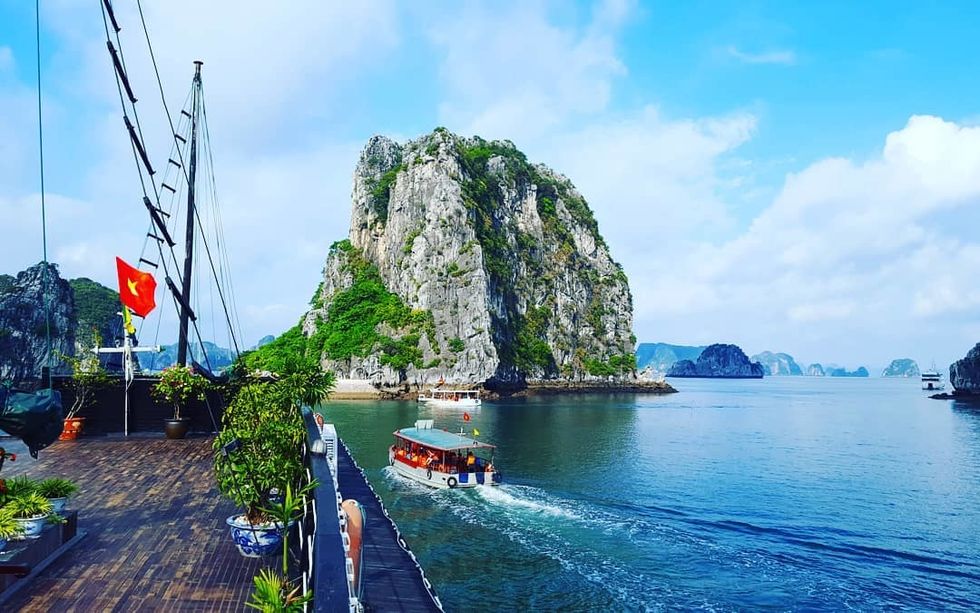I've never thought of myself as one who remains cloistered or uninformed. On the contrary, I've always held myself as one who remains very, very up to date. I watch the news. I read. I think. I debate. Given my primary profession as a student (despite moonlighting as your friendly, neighborhood burger flipper) it behooves me to remain intellectually engaged.
So, when I packed up my bags a couple of weeks ago and jetted off to the other side of the planet to visit Vietnam, I wouldn't say that I entered with a sense of naivety. I knew the history that the United States and Vietnam shared and that their current state of relations was somewhat analogous to what U.S.-China looks like (emphasis on somewhat).
As such, I resisted the call of the "noble savage" trope when interacting with a culture otherwise completely alien to me. After all, even though Vietnam is a developing country, the people there are far from unadvanced or uncivilized. Vietnam is the 14th most populous country in the world. Major cities sprawl amongst the agrarian communities that populate the rural areas of the country. If I'm being honest, I had Wi-Fi throughout my trip.
Conversely, just as I was sure to not travel naïve, so too was I sure not to travel smug. No one knows everything, and especially in interacting with a culture as different from my own as that of Vietnam, I was far from a know-it-all. Additionally, visiting the National Traditional Medicine Institute and the Acupuncture Institute in the capital of Hanoi was an eye-opening experience to the merits of alternative medicines and alternative ways of thinking about health and wellness.
However, what struck me most about Vietnam and its people was the incredible pragmatism displayed both historically and in the present day. As a nation perpetually in between, Vietnam has found itself invaded numerous times throughout history, serving as the site of many wars and proxy wars. Presently, that means walking a line between American and Chinese interests in the South China Sea, especially as the Chinese expand into the area and especially as they expand into what is internationally recognized as Vietnamese territorial waters.
Believe it or not, animosity directed at the United States for the Vietnam War (or the American War as the Vietnamese call it) is almost nonexistent. If any animosity does exist towards any ethnic or cultural group, it is almost exclusively directed at the Chinese, most certainly based on current geopolitics, but also because out of all the countries that have attacked or fought on Vietnamese soil, the Chinese are the most omnipresent, having last fought there in 1979.
Not only was I as an American welcomed graciously by the Vietnamese people in nearly every interaction with them, but so were the numerous other tourists that I rubbed elbows with. So many well-to-do North American and European tourists filled the local shops and bars that I was taken aback. Equally surprising, countless numbers of Chinese and other East Asian tourists did as well. Vietnam is far from a "hermit kingdom" as its communist counterpart in North Korea is often termed. Vietnam is open and booming with business.
In fact, that fact is what struck me most about Vietnam. Frequently, in the politics of today and especially in certain academic circles (away from the deep fryer) it is popular to dismiss capitalism as a system devoid of any merit. To denounce it as the great evil and to pine for more perfect and pure days of Marx at his peak.
But, if anything my trip to Vietnam reinforced the fallacy of this desire. Capitalism works. Communism (and to some extent socialism) does not. Prior to 1986 (when economic controls were relaxed by the single-party Vietnamese government), Vietnam was one of the poorest countries in the world. Widespread famines were common, infrastructure was poor, and health care was not readily accessible. Now all this has changed, and its economy is growing at a rate amongst the fastest in the world.
The rate of development in the country is incredible. Numerous times members of our group who had been in-country before remarked how the skyscrapers and high rises had not been there even ten years ago. And yet, perhaps even more important than the buildings or the business, especially for a country shaped by war, there is peace.
That is not to say there is nothing wrong with Vietnam or how the Vietnamese do capitalism. There is still inequality and poverty. There is still a one-party government that represses any dissent and stifles free dialogue and free exchange. Yet, as testified by the people, Vietnam is better, infinitely better, than it ever was when under the thumb of decades of tumultuous war and pure communist policy.
It's strange being back. The worlds of bustling Hanoi and rural Wisconsin are about as far apart as can be. Yet, I cherish my time spent abroad. I think it made me more balanced. Taught me a thing or two about the human condition. But most of all, it gave me hope. As my friends and I gathered with our guide and his family for dinner on a narrow street outside of his house in the heart of Hanoi, I couldn't help but be awed by the interminable goodness of human beings. We are a complicated bunch, but that goodness is the one thing that I've found time and time again that permeates all.
Vietnam gifted me a piece of goodness. I will do my best to carry it.

















